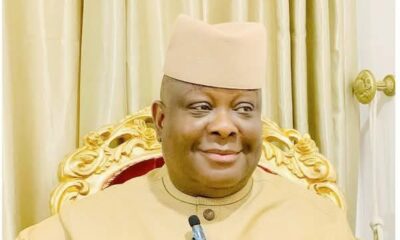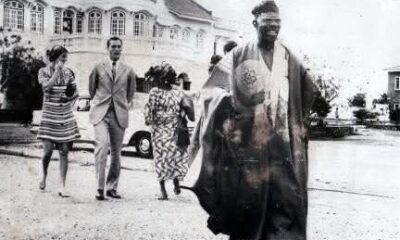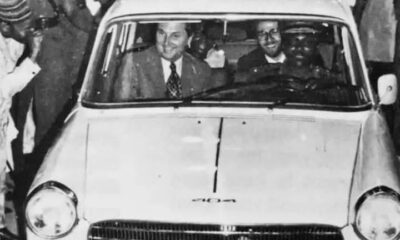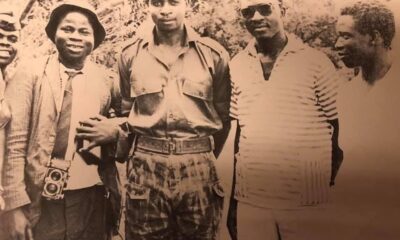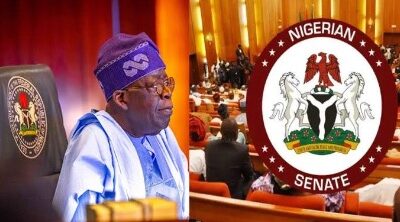Columns
Hardship Grant controversy: More States Dispute FG’s Claim of Disbursing N573 Billion Grant
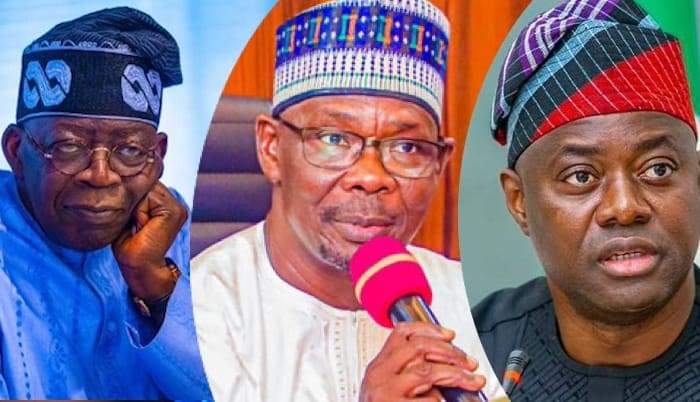
More states have refuted President Tinubu’s claim of a N573bn hardship fund, clarifying it’s a World Bank loan, not a grant.
The controversy surrounding the purported disbursement of N573 billion to subnational governments announced by President Bola Tinubu during a nationwide broadcast on Sunday, continued on Friday, as more States denied receiving such fund from his administration.
Just like the Governor of Nasarawa State, Abdullahi Sule, on Thursday, faulted the claim by the President, Governor of Oyo State, Seyi Makinde, yesterday, also denied receiving the N573 billion hardship grant claimed to have been given to the state governments by the federal government.
Abia and Osun State governments also indicated that they were yet to receive such funds, maintaining that the World Bank intervention was a loan to States and not a grant from the Nigerian government. Other states contacted also declined to comment, in an apparent move not to be seen as being in conflict with the President.
Tinubu had while addressing Nigerians in a broadcast during the #EndBadGovernance nationwide protests against hunger and hardship, said the government had disbursed N573 billion to the 36 states.
However, in a newsletter No 95 |August 2024 personally signed by Makinde, which was shared on his X handle, he said the state was not in the know of such a grant.
Makinde explained: “In my newsletter tonight, I responded to a question from a concerned citizen of Oyo State regarding the claim that the Federal Government ‘gave’ States over N570 billion as some kind of ‘hardship fund’ for citizens.
“Before I speak more on further actions we have taken to show our commitment to productivity and sustainability, let me respond to a long message I received earlier in the week from a concerned citizen. The message was about a purported N570 billion Hardship Fund “given” to the 36 States by the Federal Government. I was queried about what I used the money for.
“Let me state categorically that this is yet another case of misrepresentation of facts. The said funds were part of the World Bank-assisted NG-CARES project—a Programme for Results intervention.
“The World Bank facilitated an intervention to help States in Nigeria with COVID-19 Recovery. CARES means COVID-19 Action Recovery Economic Stimulus. It was called Programme for Results because States had to use their money in advance to implement the programme. After the World Bank verified the amount spent by the State, it reimbursed the States through the platform provided at the Federal level. The Federal Government did not give any State money; they were simply the conduit through which the reimbursements were made to States for money already spent.
“It is important to note that the World Bank fund is a loan to States, not a grant. So, States will need to repay this loan. Note also that NG-CARES, which we christened Oyo-CARES in our State, predates the present federal administration.
“So, in direct response to the message, the Federal Government did not give Oyo State any money. We were reimbursed funds (N5.98 billion in the first instance and N822 million in the second instance) we invested in the three result areas of NG-CARES, which includes inputs distribution to smallholder farmers within our State. In fact, when the World Bank saw our model for the distribution of inputs preceded by biometric capturing of beneficiary farmers, they adopted it as the NG-CARES model.”
Makinde’s denial comes on the heels of controversies that greeted the nationwide hunger and hardship protests.
Also, Abia State Commissioner for Finance, Mr. Mike Akpara, in response to THISDAY’s enquiry, said the federal government’s comment about the purported grant “is vague”.
“They should come out clear and state categorically what they gave each state,” he said, adding that when that is done, governors could be held accountable on how they spent the money.
Akpara, expressed doubt if the federal government was sure of its claims on the disbursement of the said grant to states and wondered if the amount was calculated based on the rice it distributed to states or other forms of palliatives.
According to him, loans are applied for, negotiated and processed on individual basis and any state that needed loan would pursue it without recourse to other states as a group.
Also, responding to THISDAY’s enquiries, a source from Osun State government that pleaded to remain anonymous, said the N573 billion hardship grant claimed to have been given to the state governments by the federal government was not the truth.
Governor Sule had in an interview with Channels Television, stressed that the World Bank loan received by states was for infrastructural projects and not to cushion the effects of hardship faced by Nigerians.
The governor had explained that states received the money in batches with the latest received in June, stressing that it was a loan and not free funds and was initiated in 2020.
“The money is tied to certain projects. It is almost like a regimented loan from the World Bank. The money is not for rice, it is not for palliatives, it is not for anything in that line.
“That money came from the World Bank and that was the second disbursement which came in November last year. The amount was credited to the account of every other state, sometime around January.”
Many Nigerians, including a senior lawyer, Mr. Femi Falana, a human rights crusader and the Chair, of Alliance on Surviving Covid-19 and Beyond (ASCAB), had since the announcement by the President been challenging states and the Federal Capital Territory (FCT) to explain how they spent the N573 billion.
Follow Ekwutosblog to stay informed of all the latest updates
Columns
Chief Timothy Adeola Odutola (1902–1995): Pioneer Industrialist, Nationalist and Philanthropist of Ijebu-Ode
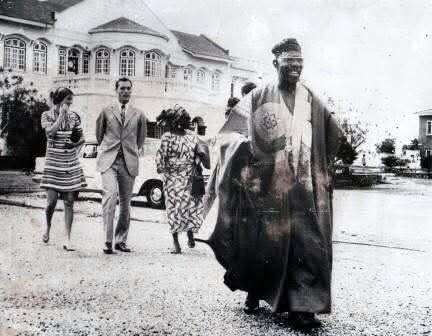
Chief Timothy Adeola Odutola was one of Nigeria’s foremost indigenous industrialists of the twentieth century, as well as a politician and philanthropist whose influence spanned commerce, nationalism, and education. Popularly known as the Ogbeni Oja of Ijebu-Ode, Odutola belonged to the pioneering generation of Nigerian entrepreneurs who laid the foundations for indigenous industrial capitalism during the colonial and early post-independence periods.
Early Life and Education
Timothy Adeola Odutola was born in 1902 in Ijebu-Ode, present-day Ogun State. He received his early education at St. Saviour’s Primary School, Italupe, and later attended Ijebu-Ode Grammar School, one of the earliest secondary schools in southwestern Nigeria. His education placed him among the emerging African elite prepared for clerical and administrative roles in the colonial system.
Early Career and Entry into Business
Odutola began his working life in the colonial service, a common pathway for educated Nigerians of his generation. However, he later resigned to pursue business independently. His early commercial ventures included trading in textiles (notably damask) and dried fish, commodities with strong local demand.
By the late 1920s and 1930s, Odutola had transitioned into the produce trade, becoming a licensed produce buyer. He invested heavily in storage facilities and transportation networks, enabling him to move agricultural products efficiently from rural areas to export points. This strategic integration helped him scale his operations rapidly.
Political Involvement and Nationalist Activities
Odutola was also politically active during the rise of Nigerian nationalism. In 1938, he served as Chairman of the Nigerian Youth Movement (NYM) in the Ijebu Division, aligning himself with one of the most influential nationalist organisations of the period.
In 1945, he represented Ijebu Province on the Legislative Council of Nigeria, the highest advisory body to the colonial government before independence. Three years later, in 1948, he was a member of the Nigerian delegation to the African Conference in London, reflecting his standing among Nigeria’s political and economic elite.
Industrial Empire and Business Achievements
By the time Nigeria attained independence in 1960, Odutola had built a large and diversified business conglomerate, making him one of the wealthiest indigenous businessmen of his era. His enterprises reportedly included:
Three industrial factories
Extensive retail and distribution franchises
A cattle ranch
A rubber and palm oil plantation covering about 5,000 acres
A sawmill
Export trading businesses
Gold exploration interests in the Ilesha area
Together with contemporaries such as Alhassan Dantata and Sir Louis Odumegwu Ojukwu, Odutola is widely regarded as part of the first generation of Nigerian industrialists who successfully competed with expatriate firms during late colonial rule.
Honours and Professional Leadership
In recognition of his contributions to commerce and public service, Odutola was awarded the Officer of the Order of the British Empire (OBE) in 1948. In the post-independence era, he became the first President of the Manufacturers Association of Nigeria (MAN), playing a central role in advocating for indigenous industrial development and protective economic policies.
Philanthropy and Legacy
Chief Odutola was also known for his extensive philanthropic activities. He funded the establishment of schools, built a church in Ijebu-Ode, and endowed professorial chairs at the University of Lagos and the University of Ibadan, contributing significantly to higher education in Nigeria.
His palatial residence, Onibudo House in Ijebu-Ode, became a symbol of indigenous wealth and success during the 1960s and 1970s and a gathering point for political and social elites.
Death and Historical Significance
Chief Timothy Adeola Odutola died in 1995, leaving behind a legacy that bridges commerce, nationalism, and philanthropy. He is remembered as a trailblazer of indigenous industrial enterprise and a key figure in Nigeria’s economic history.
Sources
Bim Babarinde Archives
Toyin Falola, Economic Reforms and Modernization in Nigeria
Manufacturers Association of Nigeria (MAN), historical records
Columns
General Yakubu Gowon and Nigeria’s First Locally Assembled Peugeot
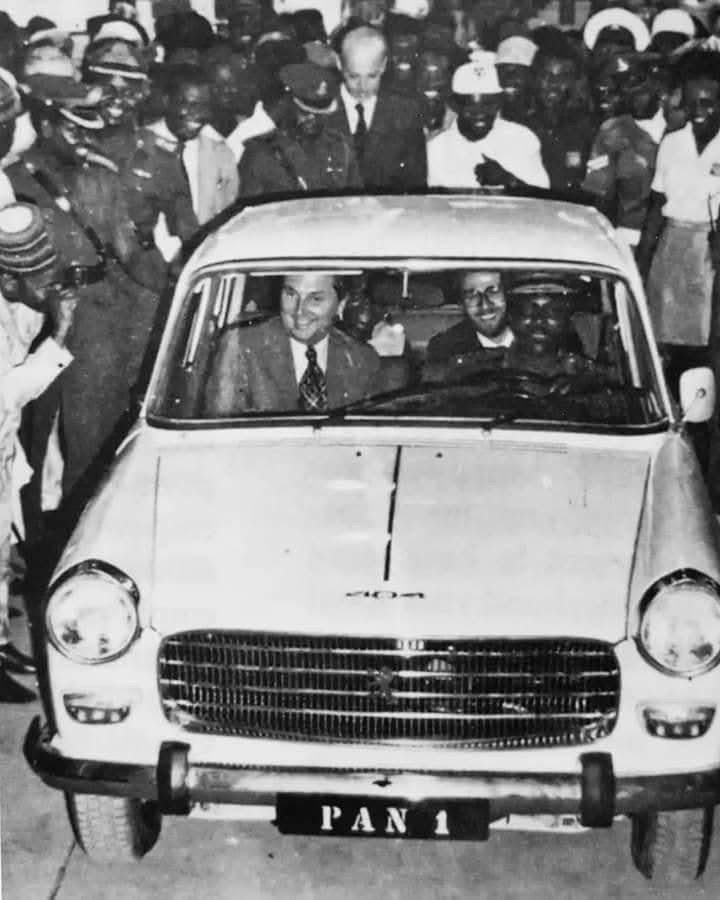
A Milestone in Nigerian Industrial History
In the mid-1970s, Nigeria took a significant step toward industrial self-reliance with the establishment of Peugeot Automobile Nigeria (PAN) in Kakuri, Kaduna. One of the most symbolic moments from this period was when Nigeria’s former Head of State, General Yakubu Gowon, personally test-drove the first vehicle assembled at the PAN plant, known as PAN 1, between 1974 and 1975. The event marked a defining chapter in Nigeria’s drive toward industrialisation and indigenous manufacturing.
Peugeot Automobile Nigeria (PAN), Kakuri
Peugeot Automobile Nigeria was established as a joint venture between the Federal Government of Nigeria, Peugeot of France, and Nigerian investors. The plant in Kakuri, Kaduna State, was designed to assemble passenger vehicles locally, reduce dependence on imported cars, create skilled employment, and stimulate technology transfer.
Kaduna was chosen due to its strategic location, existing industrial base, and proximity to rail and road networks, making it a hub for northern Nigeria’s manufacturing ambitions during the oil boom years.
The PAN 1 Test Drive
The photograph capturing General Yakubu Gowon test-driving PAN 1 holds both symbolic and practical significance. PAN 1 represents the first car assembled by Peugeot Automobile Nigeria, signifying the successful commencement of operations at the Kakuri plant.
General Gowon’s participation underscored:
The federal government’s strong political backing for industrial projects
The importance attached to local manufacturing during Nigeria’s post-war reconstruction era
Confidence in Nigeria’s ability to assemble modern automobiles to international standards
The test drive occurred during a transitional phase in Nigeria’s governance, shortly before Gowon was overthrown in July 1975, making the moment historically poignant.
Industrialisation and National Pride
During the 1970s, Nigeria pursued an ambitious industrialisation agenda, buoyed by oil revenues. PAN stood alongside other major industrial projects such as Ajaokuta Steel, Volkswagen of Nigeria (VON), and the cement factories spread across the country.
The PAN initiative:
Trained Nigerian engineers and technicians
Established local supply chains
Became a symbol of modernity and national pride
Peugeot vehicles assembled in Kaduna soon became common sights on Nigerian roads and were widely adopted by government agencies and private citizens alike.
Legacy of PAN
Peugeot Automobile Nigeria remained Nigeria’s leading automobile assembly company for decades and played a central role in shaping the country’s automotive culture. Although production levels fluctuated over time due to economic challenges, policy shifts, and import competition, PAN’s historical importance remains undisputed.
The image of General Gowon behind the wheel of PAN 1 continues to serve as a visual reminder of a period when Nigeria actively pursued industrial self-sufficiency with optimism and confidence.
The test drive of PAN 1 by General Yakubu Gowon was more than a ceremonial act—it represented Nigeria’s belief in its industrial future. The moment encapsulated the aspirations of a nation eager to build, assemble, and innovate locally. Today, it stands as an enduring symbol of Nigeria’s early automotive and manufacturing ambitions.
Source
Mohammed Tukur, Facebook Photos (archival image and caption)
Columns
Peter Obe and the Lens of History
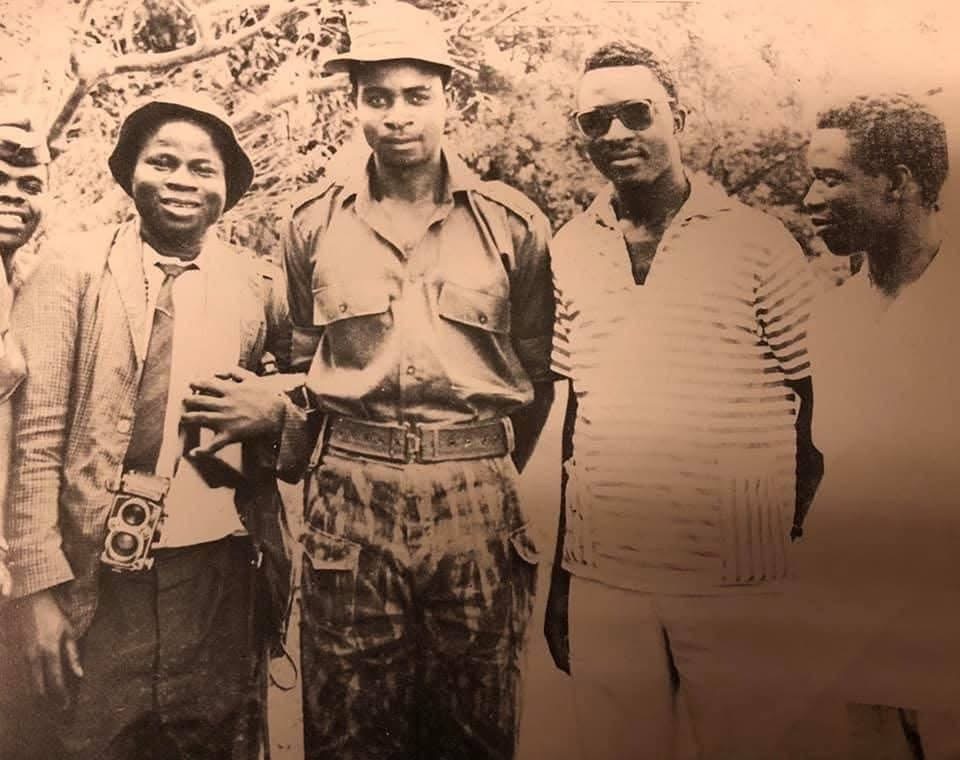
Nigerian Photojournalism, the Civil War, and a Visual Legacy
One of the most enduring visual records of the Nigerian Civil War is a photograph taken shortly after Federal troops captured Enugu in October 1967. In the image stands Peter Obe (1932–2013), one of Nigeria’s most accomplished photojournalists, alongside Lieutenant Colonel Theophilus Yakubu Danjuma and other military officers. Beyond its immediate wartime significance, the photograph symbolises the power of photography in documenting Nigeria’s most turbulent moments and preserving them for posterity.
Peter Obe: A Pioneer of Nigerian Photojournalism
Peter Obe was among the finest photographers Nigeria produced in the twentieth century. He served for many years as Chief Photographer of the Daily Times of Nigeria, then the most influential newspaper in the country. In this role, Obe documented political leaders, military campaigns, social life, and historic national events during Nigeria’s formative decades.
In addition to his work with Daily Times, Obe undertook freelance assignments for Agence France-Presse (AFP), giving his work international reach. Later, he established his own photography studio in Surulere, Lagos, a creative hub for Nigerian media professionals during the post-independence era.
The Photograph: Enugu, October 1967
The photograph featuring Peter Obe with Lt. Col. T. Y. Danjuma was taken shortly after Federal forces captured Enugu, the capital of the secessionist Eastern Region, during the Nigerian Civil War (1967–1970). The fall of Enugu marked a significant turning point in the conflict, symbolising the collapse of Biafra’s early administrative structure.
As a frontline photojournalist, Obe risked his life to document military operations, providing visual evidence of events that shaped Nigeria’s history. His work from this period remains an essential archival resource for historians studying the war.
Nigerian Photography Before and After Peter Obe
Nigerian photography predates independence by over a century. In 1859, George Da Costa established the first known portrait photography studio in Lagos, laying the foundation for indigenous photographic practice. From this early beginning emerged a lineage of photographers who shaped Nigeria’s visual culture.
Notable figures include:
Jonathan Adagogo Green of Bonny
H. Sanya Freeman
Solomon Alonge of Benin
Matthew Faji
J. D. ‘Okhai’ Ojeikere, famed for his hairstyles series
Yusuf Oladele
Jackie Phillips
Sunmi Smart-Cole
Gani Layiwola
Cornelius Oyemade
Baba Shettima
In the later twentieth and early twenty-first centuries, photographers such as Don Barber, Jide Adeniyi-Jones, and Tam Fiofori continued this tradition, blending documentary realism with artistic expression.
Peter Obe stands prominently within this continuum, bridging early post-colonial photography and modern Nigerian photojournalism.
Publication and Archival Value
Many of Peter Obe’s most important images, including the Enugu photograph, were compiled in his book:
Nigeria: A Decade of Crises in Pictures
This work remains a critical visual archive of Nigeria’s political instability, military rule, and civil conflict between the 1960s and 1970s. It is frequently cited by scholars, journalists, and curators documenting Nigeria’s modern history.
Legacy and Significance
Peter Obe’s contribution transcends aesthetics. His photographs:
Serve as primary historical evidence
Preserve moments that written records alone cannot capture
Help humanise political and military history
Through his lens, Nigerians can see their past clearly—unfiltered, immediate, and honest. His work helped establish photography as a respected tool of journalism and historical documentation in Nigeria.
The photograph of Peter Obe with Lt. Col. T. Y. Danjuma in post-capture Enugu is more than a wartime image; it is a testament to the courage of Nigerian photojournalists and the enduring value of visual history. Peter Obe’s legacy remains firmly etched into Nigeria’s collective memory, ensuring that critical moments of national crisis are neither forgotten nor distorted.
Sources
1. Obe, Peter. Nigeria: A Decade of Crises in Pictures. Lagos: Daily Times Publications, 1978.
2. Falola, Toyin. The History of Nigeria. Greenwood Press, 1999.
3. Madubuike, Uche. “Photojournalism and the Nigerian Civil War.” Journal of African Media Studies, Vol. 6, No. 2, 2014.
-
Business1 year ago
US court acquits Air Peace boss, slams Mayfield $4000 fine
-

 Trending1 year ago
Trending1 year agoNYA demands release of ‘abducted’ Imo chairman, preaches good governance
-

 Politics1 year ago
Politics1 year agoMexico’s new president causes concern just weeks before the US elections
-

 Politics1 year ago
Politics1 year agoPutin invites 20 world leaders
-

 Politics1 year ago
Politics1 year agoRussia bans imports of agro-products from Kazakhstan after refusal to join BRICS
-
Entertainment1 year ago
Bobrisky falls ill in police custody, rushed to hospital
-
Entertainment1 year ago
Bobrisky transferred from Immigration to FCID, spends night behind bars
-
Education1 year ago
GOVERNOR FUBARA APPOINTS COUNCIL MEMBERS FOR KEN SARO-WIWA POLYTECHNIC BORI

